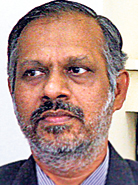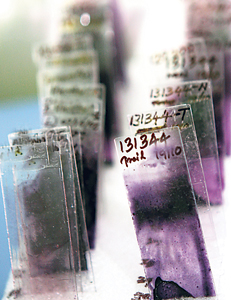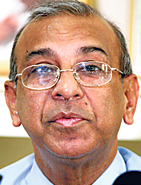Women should not allow their biological clock to tick if they wish to conceive and have a healthy baby, is repeated over and over again. Put baby before career, for one can always go back to work and catch up on the career but if time passes having a baby may not be possible.
Now comes a strong message that the other vital partner in the making of a baby, the father, too should not leave it too late.
With disturbing statistics that 1 in 6 couples need help in achieving a pregnancy, the advice from Dr. N. Pandiyan, Chief Consultant in Andrology and Reproductive Medicine of Chettinad Health City in India, is indeed timely.
 |
| Dr. Pandiyan |
“Infertility is an age-related disease of the reproductive system and it is a race against time,” he says, explaining that two factors independently influence the prognosis of infertility – the age of the couple, particularly the woman, but also of the man and the duration of infertility.
Dealing with the age of the father, he points out that men over 40 years old had a “negative effect” on pregnancy, while there was also an increase in the miscarriage rates.
The adverse effects of older fathers include a higher mortality in the offspring of those who are 45 years old or more, with that going into adulthood as well. “Advanced paternal age has been associated with a higher risk of spontaneous miscarriage, stillbirth, pre-term birth, congenital malformations, childhood cancer, epilepsy, autism and schizophrenia in the offspring,” says Dr. Pandiyan.
Producing data to prove his point, he says studies on age and incidence of infertility show that those in the age group 20-24 had a 6% incidence of infertility; 25 to 29 -- 9%; 30 to 34 – 15%; 35 to 39 – 30% and 40 to 44 – 64%.
The lifestyle of the father also plays a major role, The Sunday Times understands. Quoting research, Dr. Pandiyan says that obesity increases the risk of male sub-fertility. The use of laptop computers on the lap and cell phones and also stress, have been implicated as possible “causative factors” for male sub-fertility.
Smoking impairs semen parameters and fertility while alcohol abusers have poorer semen samples, according to further research. “Drugs, both medical and recreational, impair male fertility, as does exposure to gonadotoxins from the environment and occupation.”
 |
| In the Vindana laboratory: Blood samples taken
for testing. |
Leaving aside the father’s impact, Dr. Pandiyan goes back to the time, after conception when the baby boy is still a foetus in the mother’s womb.
“Prevention of male sub-fertility starts peri-conceptually,” he explains, adding that healthy mothers give birth to healthy children. “A mother’s micro and macro environment influences the child’s reproductive health. The in-utero environment influences adult life and may also influence the reproductive health of the children.”
Pointing an accusing finger at many environmental contaminants that can affect reproductive health, this expert on andrology zeroes in on “endocrine-disrupting chemicals” which could affect hormones in the human body.
Dr. Pandiyan picks on bisphenol A (BPA) found in hard plastic, water and baby bottles, food containers, the lining of metal, food and drink cans, pacifiers and baby toys and dental sealants. Phthalates, the other culprit according to him, are a family of chemicals utilized to soften plastics used in medical devices, food wrap, flooring, wall coverings, personal care products (perfumes, lotions, cosmetics, hair spray), lacquers, varnishes and wood finishes and coatings.
Environmental contaminants during any life stage can increase the risk of adverse health effects, he says, stressing however that exposure during “susceptible windows” can result in irreversible effects that can have either immediate, lifelong or even intergenerational impacts on health.
“Humans are exposed daily to a mixture of environmental contaminants in air, water, food and consumer products. Environmental tobacco smoke, lead, mercury and phthalates are detected in nearly all members of the population. Melamine has recently been implicated in reproductive and urinary disorders,” he says.
 |
| Smoking impairs semen parameters and fertility |
In the case of fertility problems, the world has advanced and many couples have experienced the joy of parenthood through Assisted Reproductive Techniques. (ART).
Although as Dr.Pandiyan stresses conception in the privacy of the bedroom is any day better than high-tech ART centres, for some the only hope of holding a baby would come through such techniques which mimic nature or give a helping hand to nature.
Having a baby is an investment
Is having a baby a luxury or a basic necessity? If needy couples have fertility problems should their yearnings for a baby remain unfulfilled with additional heartache being faced due to the barbs of malicious relatives?
If a person wants to buy a car, banks give loans, why shouldn’t the same apply for a much more important life-time investment of having a baby who would grow up to be a person who contributes to society, asks Dr. Pandiyan.
He urges that an insurance or loan scheme be introduced, taking into consideration that fertility issues are similar to any other disease. “Otherwise countries need to follow the Brunei model where the couple pays for the IVF cycle and the government pays for the drugs.”
Assisted Reproductive Techniques are costly because of the high cost of medication, it is learnt. The parents of the first baby born at Vindana underwent ART free of charge, it is understood.
101 babies in 10 years
Ten years and 101 babies later, it was celebration time for the Vindana Reproductive Health Centre last weekend.
While Vindana had invited two of its major supporters during the initial stages, Prof. Ariff Bongso and Dr. N. Pandiyan, to be part of their celebrations, the major focus was in fact a series of workshops to share the knowledge of their multidisciplinary team.
 |
| Prof. Seneviratne |
Considered one of the foremost scientists on infertility in Asia, Prof. Bongso is Research Professor and Leader of the Reproductive Stem Cell Sciences group in the Department of Obstetrics and Gynaecology and Co-Leader of the Regenerative Medicine group of the Yong Loo Lin School of Medicine, National University of Singapore.
Vindana can justifiably be proud of its achievements in the past 10 years. Starting with in-vitro fertilization (IVF) in 1998 it has expanded to setting up a state-of-the-art sperm bank, egg sharing and also donation programme, Intra Cytoplasmic Sperm Injection using Testicular Sperm Aspiration and pregnancies using frozen and later thawed embryos, to put a smile on the face of couples with fertility issues.
The first IVF pregnancy managed and facilitated by a totally local team, saw the birth of a bouncy baby girl on July 1, 2002. Now she is a pretty six-year-old.
As Vindana steps into its 11th year, its sights are set on expansion into and linkages with affiliated fields such as genetics, molecular biology and in-vitro tissue biology, says its Chairman Prof. Harsha Seneviratne, well-known Obstetrician and Gynaecologist, adding that they will also help any other programme which hopes to assist couples facing fertility issues. |




